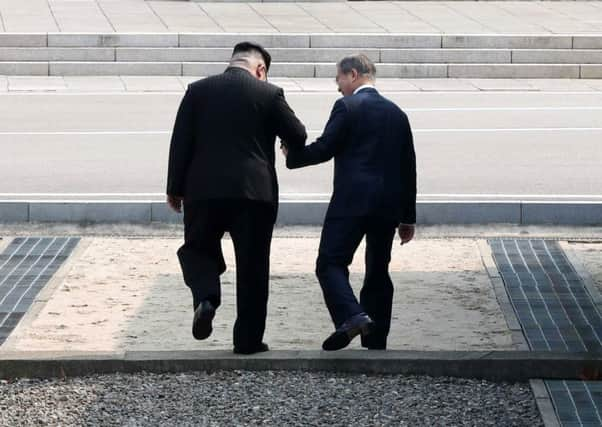Leader comment: Peace in our time for the two Koreas?


It was an extraordinary sight: the leaders of South and North Korea, hand-in-hand, crossing the world’s most heavily fortified border.
To paraphrase Neil Armstrong, it was a few small steps for them but, just possibly, a giant leap for humanity. Sixty-eight years after the Korean War began, peace seems finally to be in sight.
Advertisement
Hide AdAdvertisement
Hide AdA few months ago, North Korea was revelling in threats about the nuclear destruction of its supposed enemies; yesterday the North’s Kim Jong-un and the South’s Moon Jae-in issued a joint statement about the denuclearisation of the Korean Peninsula, “national reconciliation and unity” and “a permanent and solid peace regime”.
Taken at face value, it was a historic moment on a par with Nelson Mandela’s release from prison and the fall of the Berlin Wall.
The most important question is whether the North is sincere and how far Kim is prepared to go to release his people from the horror of their everyday lives. The North has a track record for ramping up the rhetoric to create a crisis, prompting international talks that result in aid which then helps to prop up its ailing economy and the regime. This time, it certainly feels different, largely because of Kim’s decision to visit the South but also because of simple things like the friendly body language of the two leaders. However, analysts were understandably cautious, with Dr Adam Cathcart, in an article for the Royal United Services Institute think tank, suggesting people should “hope for the best, prepare for the worst”.
Another question is why has this happened and who should take credit? China’s influence, the North’s internal politics, and a rock collapse that is thought to have rendered North Korea’s nuclear test site unusable may all have played a role.
Supporters of Donald Trump were quick to suggest his tough approach – such as telling “Little Rocket Man” Kim that he had a “much bigger and more powerful” nuclear button to press – appeared to have borne fruit.
However, it is telling that Moon had abandoned the hard-line approach of his immediate predecessors as South Korean president and returned to the dovish “Sunshine Policy” of the 2000s. It may have been a combination of all these factors.
But, whatever the reason, the world should ensure it does all it can to grasp this chance of a lasting and true peace with both hands.
